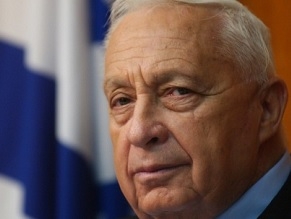|
World Jewish News

Former prime minister Ariel Sharon (photo credit: Sharon Perry/Flash90/File)
|
Ariel Sharon’s condition ‘critical, gradually deteriorating’
03.01.2014, Israel Former prime minister Ariel Sharon remains in critical condition, but is gradually deteriorating, and is suffering from continuous organ failure that may lead to critical damage to many bodily systems, Sheba Medical Center director Zeev Rotstein said on Friday.
“He is fighting like a true warrior, as he has all his life,” Rotstein said of the former general during a press conference at the hospital. “But as time passes, the situation will not get better and we understand what happens in situations like these.”
On Wednesday, hospital personnel had put out a laconic statement saying the comatose former leader’s condition had taken a turn for the worse.
His family was at his bedside on Thursday afternoon, and his condition has since been defined as critical, with indications that he has at most a few days to live.
Doctors said Sharon, 85, who has been in a vegetative state since 2006, was suffering from renal failure that could lead to multiple organ system failure and death. On Thursday morning, Rotstein confirmed that Sharon, who has been hospitalized at Sheba for seven years, was suffering from failure of multiple “organs that are vital to life.”
The hospital director said that while Sharon’s condition had “seen ups and downs” in the past two-and-a-half months, his life was now in danger.
“The danger [to Sharon's life] exists, [but] as we know, Arik [Sharon] is a powerful man and has survived difficult situations during his time in our hospital,” he continued. ”I’m no prophet, but the feeling among the doctors treating him and the family by his side… is that he has taken a turn for the worse.”
Rotstein added that Sharon wasn’t receiving dialysis treatment, as it was not recommended for a patient with multiple organ failure. He said the ex-prime minister had received antibiotic treatment in recent weeks for infections that caused his condition to deteriorate.
“He is receiving all the treatments that a patient in his condition should receive,” he said.
In September, doctors reinstalled a feeding tube in Sharon’s digestive system. The procedure was completed without incident, and the former prime minister was returned to the hospital’s Department of Respiratory Care and Rehabilitation, where he has been in treatment in recent years.
Sharon is one of Israel’s most iconic and controversial figures. As one of Israel’s most famous generals, Sharon was known for bold tactics and an occasional refusal to obey orders. As a politician he became known as “The Bulldozer,” a man contemptuous of his critics while also capable of getting things done.
As defense minister, he led Israel’s 1982 invasion of Lebanon, and was forced to resign the post after a commission of inquiry found him responsible for failing to prevent the massacre by Christian Phalangists of Palestinian refugees in Beirut’s Sabra and Shatila camps.
A prominent hard-line voice over the decades, he was elected prime minister in 2001.
In mid-2005, he directed a unilateral withdrawal of Israeli troops and settlers from the Gaza Strip, ending a 38-year military control of the territory. It was a shocking turnaround for a man who had been a leading player in building Jewish settlements in captured territories.
He bolted the Likud party soon after and established the centrist Kadima party, where he was joined by Ehud Olmert and Tzipi Livni. He appeared on his way to an easy reelection when he suffered a severe stroke in January 2006. His deputy, Olmert, took over and was elected prime minister a few months later.
Sharon had a first, small stroke in December 2005 and was put on blood thinners before experiencing a severe brain hemorrhage on January 4, 2006. After spending months in the Jerusalem hospital where he was initially treated, Sharon was transferred to the long-term care facility at Tel Hashomer Hospital. He was taken home briefly at one point, but was returned to the hospital, where he has been since.
By Times of Israel staff. Ilan Ben Zion, Yifa Yaakov and AP contributed to this report.
The Times of Israel
|
|
